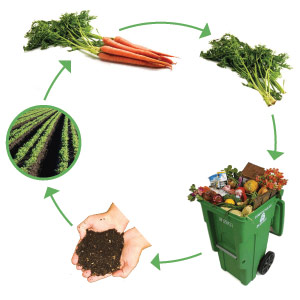The company also has an agreement with two major slaughter houses in Kiserian who slaughter on average 200 cows and thousands of goats daily to get waste. “We currently don’t treat the animal blood because we don’t have the requisite technology to do it but it is something we would definitely explore in future. But the waste on its own is too much. Even in situations where the slaughter houses channel the waste for biogas, much more is left unused. Sometimes they even pay people to dispose the waste which becomes an eyesore. We are however very strict on the waste delivered and must ascertain before we purchase that it is not mixed with anything,” said Robert Kariuki one of the directors at the company.
Once the waste is gathered at a central location, composting begins. “This is the process of exposing the waste to extremely high temperatures to sterilize it and remove any disease causing organism that may be harmful to a plant. This process is extremely important and is what separates safe good manure from the others,” Kariuki explained.

Composting, Kariuki further explains, ensures that compounds in the manure are broken down into components that make it easy for plants to absorb nutrients. Composting takes on average five weeks. After the sterilization microbial agents are introduced into the manure by use of a liquid solution that further enhances safety and increases the potency of the manure.
The organic fertilizer is then taken to the laboratory to test whether there are any more harmful and disease causing micro organisms. A sample is also taken to the Kenya Bureau of Standards for quality check. This is followed by a process called fortification where nutrients that may be lacking are added. “We need to understand whether the fertilizer has all key nutrients crucial for a plant growth and at what percentage. We test for nutrients like Nitrogen, Phosphorous, Potasium and carbon matter. It is very important that we get all these right,” said Kariuki.
Such meticulous attention to detail is now opening up new markets for the organic fertilizer market with farmers from as far as Kagio, Embu and Nyahururu expressing insatiable appetite for the fertilizer.
Already Essentia Kanan has developed and produced the organic fertilizer in large scale for Ngare Narok Meat Industries, a company in Rumuruti involved in livestock. It’s from their abbatoirs that the organic fertilizer came from.
For the small holder farmers the company packages fertilizers in 50kg bags and 10kg bags at a cost of Sh1500 and Sh500 respectively. If a farmer is buying the fertilizer in bulk, without the packaging, they get it a Sh30 per kilo.
The customer base spans greenhouse farmers, farmers into plantains like bananas and smallholder farmers.
Certain farmers come with their own specification which the company responds to. Say a farmer wants a fertilizer that is highly concentrated in nitrogen “We assist them through fortification and other processes because we understand farmers’ needs are different,’’ Kariuki said.

So why buy the packaged fertilizer while one could get it ready from their livestock. According to Kariuki, this is where farmers go wrong. Any manure takes time to compost. So once it is placed on soils, the nutrients don’t automatically get absorbed by the plants as the compounds first get broken down. It takes months and by the time the nutrients are being released they are of little or no use to the crop. “Again with our composting and laboratory analysis, it means we understand what nutrients are lacking in that particular matter and we can fortify it to boost nutrient levels. With our composting it also means we ensure all harmful elements have been completely removed,” he said.
Kariuki, whose background is Chemical Engineering and processing and additional experience in environmental management and legislation said poor farm management is costing farmers a fortune. With his fellow director John Kamau who has a wealth of experience in organic farming, the company has now gone beyond selling the fertilizers to offering farm management consultancy and at times training farmers. “It is very heartbreaking when you see farmers investing so much but a small mistake costing them their entire yields. This farm management information gap is what we are trying to close, because once the farmers get it right then everything else falls in place,” Kariuki added.
Research has shown that years of farming with minimum replacement of nutrients in soil has led to what is christened tired soils which have had a toll on yields. This is further exacerbated by over use of chemical fertilizers and conventional pest control arsenals which leave heavy metals on soil.
According to Food and Agriculture Organization, over cultivation and nutrient mining has degraded farms’ peak soil which is putting pressure on food production. Alliance for Agrarian Revolution in Africa (AGRA) posits that poor soils caused a 40 per cent dip in crop yields in 2013 in a sorry state of affairs being felt across Sub Saharan Africa with the depleted soils costing the region farmers over $4billion yearly in lost productivity. For example, according to AGRA, while farmers in most parts of the globe on average get five tonnes of yield from a produce like maize per hectare, farmers in Africa gets one tone.
AGRA vouches for simple farming techniques like mixing organic matters like crop residue and manure among others to correct the situation.




